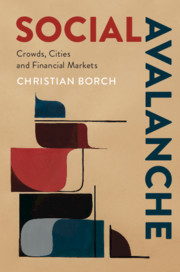5 - Financial Markets
Published online by Cambridge University Press: 18 January 2020
Summary
This chapter focuses on financial markets and how these markets have enjoyed close ties to cities. It also demonstrates that social avalanches and tensional individuality have played a central role in how financial markets work and are conceived. I discuss this by examining the historical design of the trading floors of stock and commodity exchanges, introduced to avoid emergence within these exchanges of the avalanching of metropolitan life, as well as contrarian investment advice, which suggested techniques for how to avoid the avalanching properties of markets, techniques that ultimately subscribed to a tensional notion of individuality. The chapter also discusses more recent market developments such as the increasing computerisation of financial markets. I focus on the rise of algorithmic finance, in which fully automated computer algorithms are behind the majority of activity in financial markets. Through a discussion of the Flash Crash that took place in US markets in May 2010, I argue that fully automated algorithms may engage in social avalanching, meaning that sociality can indeed be ascribed to non-human algorithms.
Keywords
- Type
- Chapter
- Information
- Social AvalancheCrowds, Cities and Financial Markets, pp. 188 - 243Publisher: Cambridge University PressPrint publication year: 2020

